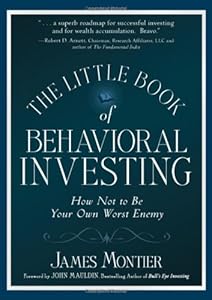“But, Why Should I Own This Investment?”
Hope keeps the world going. Optimism makes awful situations bearable. Both are laudable qualities; invaluable life skills that help us survive. But in the investment world, hope can take you from prosperity to penury in no time. In the investment jungle, it’s the pessimists and skeptics who win.
So, we’re on to Chapter 3 of The Little Book of Behavioral Investing: How not to be your worst enemy, and back to recounting the many weaknesses of the home sapiens family that make us bad investors. First, we learned about the “empathy gap,” then “temporary paralysis,” and this time it’s our inescapable preponderance towards optimism, compounded by the illusion of control.
According to motivational speakers and life experts, those who see the glass half-full have a better chance at happiness than those who see it half-empty. Maybe so. But this viewpoint can also lead to a false sense of security that can backfire in trading. Montier elucidates the point.
According to him, too many of us have an inflated opinion of our own abilities, acumen or intellect. Though that’s not a very nice thing for him to say, there’s some truth in it. I believe that if I ever fall down the balcony of my third floor apartment (yes, weird thoughts come and go in my head) onto the soft green garden below, I’ll land on all fours like an agile cat. My brain knows it’s improbable but I somehow believe that’s how it will be.
Optimism (however foolish) is a hard thing to get rid of unless you’re clinically depressed. In fact, depression is probably a good mental state while devising an investment strategy but that’s easier said than done. Optimism is a default reaction, too deeply ingrained in our X-systems (another thing to blame on evolution) to shake off. Research further shows that we become even more optimistic under pressure, a dangerous frame of mind for investors.
Stockbroker research too is largely optimistic. In fact, highly publicized ratings and market research available on Dalal Street listings, media channels and expert talk shows are often a mix of optimism, borrowed research, questionable valuation methodologies, self-serving bias, and sensationalism. Montier outlines 3 self-serving principles of stockbroker research:
Rule 1: All news is good news.
Rule 2: Everything is always cheap.
Rule 3: Assertion trumps evidence.
If only optimism could be switched on or off per convenience. Many of the top investors manage it. But it’s not going to be easy, bet on it. Good practices never are.
Montier believes we’re all victims of the illusion of control too. We think we know what we’re doing after experiencing a run of good luck in say, a game of cards, a lottery or trading. We start believing that we have the Midas touch; that a series of coincidences is really an outcome of our skill. Wrongly placed confidence leads to flawed decision making which leads to loss and pessimism. And what good will that do you now?
So, how do we beat over-optimism? A simple way is to change our default trading question from “Why shouldn’t I own this stock?” to “Why should I own this stock?” Become skeptical of every piece of research that comes in; evaluate it by your own standards. Suspect, question, and learn to say “no,” not only to others but also yourself. And make sure that it fits into a larger investment theme.
If this turns you into a complete cynic, so be it. At least you’ll have some profit to smirk on. Or for all you know, you’ll manage the Dr. Jekyll and Hyde business easily. See? Optimism! Nothing kills it.
Monica Samuel is doing a chapter-wise review of the book: The Little Book of Behavioral Investing: How not to be your worst enemy by James Montier. You can follow the series by following this tag: tlbbinvesting or by subscribing to this rss feed: tlbbifeed


Comments are closed, but trackbacks and pingbacks are open.